 MyDogBreeds
MyDogBreeds Both Native American Indian Dog and Catahoula Bulldog are originated from United States. Native American Indian Dog may grow 32 cm / 12 inches shorter than Catahoula Bulldog. Native American Indian Dog may weigh 74 kg / 164 pounds more than Catahoula Bulldog. Native American Indian Dog may live 3 years more than Catahoula Bulldog. Native American Indian Dog may have less litter size than Catahoula Bulldog. Native American Indian Dog requires High maintenance. But Catahoula Bulldog requires Low maintenance
Both Native American Indian Dog and Catahoula Bulldog are originated from United States. Native American Indian Dog may grow 32 cm / 12 inches shorter than Catahoula Bulldog. Native American Indian Dog may weigh 74 kg / 164 pounds more than Catahoula Bulldog. Native American Indian Dog may live 3 years more than Catahoula Bulldog. Native American Indian Dog may have less litter size than Catahoula Bulldog. Native American Indian Dog requires High maintenance. But Catahoula Bulldog requires Low maintenance
 The Native American Indian Dog is an ancient breed, that some consider to be feral. It is a landrace breed that developed with the indigenous peoples North America. These dogs originally looked and sounded like wolves and it is likely that their ancestry is tied to wolves crossed with pre-Columbian American dogs that came to the America’s with the first peoples. There are some that believe the Native American Indian Dog is a connecting line back to the dogs or wolves that over 12,000 years ago were the first to be domesticated by human beings.
The Native American Indian Dog is an ancient breed, that some consider to be feral. It is a landrace breed that developed with the indigenous peoples North America. These dogs originally looked and sounded like wolves and it is likely that their ancestry is tied to wolves crossed with pre-Columbian American dogs that came to the America’s with the first peoples. There are some that believe the Native American Indian Dog is a connecting line back to the dogs or wolves that over 12,000 years ago were the first to be domesticated by human beings.
They are now a rare breed in the wild and a small group of domesticated dogs. Fossil studies in recent years suggests that the Native American Indian Dogs came to North America about 4500 years after the first indigenous peoples. It is believed that the Native Americans bred the dogs that traders and explorers brought with them to the native coyote as well. This created a breed specific to North America and called the Common Native Dog or the Common Indian Dog. The original NAID was a mix of many different breeds of dogs and wild canines.
Today’s NAID is said to be raised on Indian reservations in the United State and represent a mix of Chinook, Husky, German Shepherd Dog and Malamute, along with perhaps some of today’s wolf mixed in. This dog is raised domestically and is socialized to life with humans. They are the last remaining breed from all the Native North American dogs that lived with the original people of the Americas. They are also thought to have an ancestry similar to the Australian Dingo.
They are a devoted, protective and loyal breed though they tend to be shy. They need to be outside for the majority of the day and don’t do well in crates. They need a fenced yard and room to roam. They are working dogs that hunted, pulled sleds and guarded their homes. They still need a job to so.
Today the North American Indian Dog is being bred to replicate the temperament and appearance of the originals. Although there are many breeders working from the founding breeder with original stock, there are only six that are officially given authorization to breed the NAID. They are registered by Terra Pines with the National Kennel Club but not recognized by the AKC and UKC.
The breed name NAID is trademarked by Karen Markel of Majestic View Kennels in the 1990’s. Today the breed is nationally recognized as a breed very much like the original Native American dogs, The breed is intelligent and quite healthy. They enjoy people and engage in many companion activities.
Whatever its true ancestry the current Native American Indian Dog (NAID), today’s version is not recognized by the AKC, but they are recognized by the Dog Registry of America, the Native American Indian Dog Registry and the National Kennel Club.
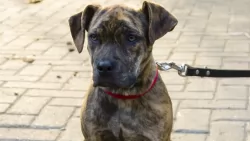 Long ago, ranchers kept the Catahoula Leopard to catch and carry prey, but because it lacked the strength to do so, they would include other stronger dogs in the pack. The American bulldog was more well built, stronger and more aggressive, and the idea was to mix the American Bulldog with the Catahoula Leopard Dog. This brought about the Catahoula Bulldog which has been in existence for some 100 years.
Long ago, ranchers kept the Catahoula Leopard to catch and carry prey, but because it lacked the strength to do so, they would include other stronger dogs in the pack. The American bulldog was more well built, stronger and more aggressive, and the idea was to mix the American Bulldog with the Catahoula Leopard Dog. This brought about the Catahoula Bulldog which has been in existence for some 100 years.
The Catahoula Bulldog became known for its stamina and strength and in 1951 the breed registry started. As a hybrid, the Catahoula Bulldog isn’t officially recognized by the American Kennel Club.
 There are two sizes of the North American Indian Dog – they are medium and large. They have dense short double coats, or they have long top coats and a fairly dense undercoat. They come in a variety of colors mostly black or silver but there is also a tortoiseshell. These tortoiseshell colored dogs are considered by Native Americans to be sacred beings. These tortoiseshell dogs are strikingly good looking and are called Spirit Dog.
There are two sizes of the North American Indian Dog – they are medium and large. They have dense short double coats, or they have long top coats and a fairly dense undercoat. They come in a variety of colors mostly black or silver but there is also a tortoiseshell. These tortoiseshell colored dogs are considered by Native Americans to be sacred beings. These tortoiseshell dogs are strikingly good looking and are called Spirit Dog.
They all have the look of a Siberian Husky or Alaskan Malamute with upright ears and almond shaped eyes that are anywhere from amber to brown with some blue. Usually their tails are down and long but can be curled. They resemble the wolf and have that wild, feral appearance. They can be as large as over one hundred pounds or average seventy to eighty pounds. They are strong, alert and intelligent. They are considered to be hypoallergenic, shedding their coat only once a year.
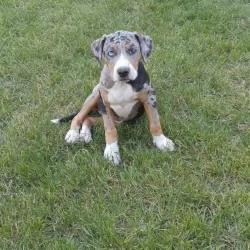 The Catahoula Bulldog is a strong-looking, medium- sized dog of 55-66cm in height and weighing in at 34-46kg. He has a short, smooth, water-repellent coat. The coat can be in a number of colors – white, brown, black or grey or he can be bi-colored such as in brown and black or white and black.
The Catahoula Bulldog is a strong-looking, medium- sized dog of 55-66cm in height and weighing in at 34-46kg. He has a short, smooth, water-repellent coat. The coat can be in a number of colors – white, brown, black or grey or he can be bi-colored such as in brown and black or white and black.
The dog appeals to a lot of people because it sheds very little. The ears of the Catahoula Bulldog are somewhat floppy and the long tail is mostly docked. The dog has unusual eyes and these can be brown, but also in shades of blue or green or even a combination of these colors.
This is a relaxed dog breed but having said that, he is also a protective breed, and then his fearless qualities come out. He becomes alert to strange noises. He is loyal and intelligent and loves to spend time with his human family. He is somewhat stubborn and independent, and early training and socialization should be provided. This ensures he is even more amicable around children in the home as well as around pets.
 This breed is gentle and loving with children.
This breed is gentle and loving with children.
Endurance, strength and good health.
Low adaptability to small living spaces and lack of outside space; don’t do well in crates and need an experienced dog owner.
They are highly intelligent, love to learn and are just a little stubborn.
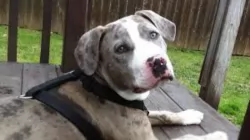 The Catahoula Bulldog is such an all-round dog breed – he loves to work and be active but he also loves to be with his human family. He is smart, active, loving and devoted and makes a splendid working dog or human companion, though he will always need to be kept busy.
The Catahoula Bulldog is such an all-round dog breed – he loves to work and be active but he also loves to be with his human family. He is smart, active, loving and devoted and makes a splendid working dog or human companion, though he will always need to be kept busy.
He is a healthy dog breed too, and is actually low maintenance which is just one of the many advantages of keeping him as a pet.
For all that he offers you, it is up to you as a responsible dog owner to provide him with a loving and nurturing environment so that he can continue to live up to the high standards this dog breed is known for.
 This is a fairly healthy, long lived breed having spent so much of its history in isolation. They are prone to some of the issues that affect all medium to large breeds.
This is a fairly healthy, long lived breed having spent so much of its history in isolation. They are prone to some of the issues that affect all medium to large breeds.
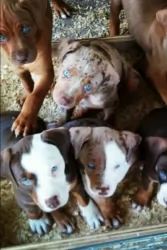 The Catahoula Bulldog is known to be a robust dog breed, full of energy. With good care – healthy diet, clean, fresh water and love and attention – he can live up to be between 10 and 16 years of age.
The Catahoula Bulldog is known to be a robust dog breed, full of energy. With good care – healthy diet, clean, fresh water and love and attention – he can live up to be between 10 and 16 years of age.
However, with every dog breed there will be some common dog ailments to watch for and these include hip dysplasia, some eye disorders and congenital heart defects. Some Catahoula Bulldogs can become deaf in one ear, or blind in one eye.
 Because of their propensity to grow to quickly the puppy should only stay on puppy food for 8-10 months. Feed them a high quality large dog puppy food 3-4 times daily for a total of 2-21/2 cups per day.
Because of their propensity to grow to quickly the puppy should only stay on puppy food for 8-10 months. Feed them a high quality large dog puppy food 3-4 times daily for a total of 2-21/2 cups per day.
Feed a high protein, large dog dry food twice a day for a total of two cups. Do not over feed. Do not feed right before or after exercise do to the risk of bloat.
Healthy, strong long lived dog.
This is not an indoor, couch potato dog. They need exercise and they need space. They won’t do well as apartment dogs unless you can take them to a dog park for over an hour every day. They really need a large fenced in yard. They don’t do well in crates either. He doesn’t understand crates and thinks you are punishing him. They make great hunters, search and rescue dogs, service dogs and therapy dogs. They will succeed at pulling competitions and weight competitions.
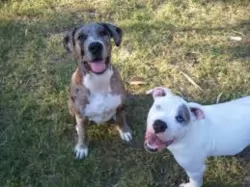 The energy levels of the Catahoula Bulldog are high and he is going to need ongoing mental- and physical stimulation. He wants to be part of all the activities in the family and you will need to take him for walks or take him with you when you go cycling or jogging. He’ll love to join in with all kinds of ball games.
The energy levels of the Catahoula Bulldog are high and he is going to need ongoing mental- and physical stimulation. He wants to be part of all the activities in the family and you will need to take him for walks or take him with you when you go cycling or jogging. He’ll love to join in with all kinds of ball games.
The best kind of environment for the Catahoula Bulldog is a country home with lots of fields to run in, but if you keep him in the city, he can do well provided you make sure to include plenty of daily exercise activities for him.
The short, smooth coat of the Catahoula Bulldog won’t require much grooming, so a good brush twice a week will be excellent for this dog who will just love the interaction this activity brings.
Ensure that your Catahoula and Bulldog mix has food which is full of vitamins and minerals as he is an energetic dog. If you make use of a commercially manufactured product, make sure it is one of the top quality ones guaranteed to ensure good health.
Don’t just put a bowl of dog pellets in front of your dog day after day, but make it interesting and nutritious for your pet by adding in raw meat, rice, vegetables and some cooked meat from time to time. An adult dog can be fed once or twice a day.